|
|
|
Sort Order |
|
|
|
Items / Page
|
|
|
|
|
|
|
| Srl | Item |
| 1 |
ID:
131483
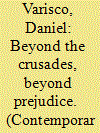

|
|
|
|
|
| Publication |
2014.
|
| Summary/Abstract |
As the Moroccan American scholar Anouar Majid reminds us on the first page of his latest book, Islam and America: Building a Future without Prejudice, we are drowning in information about the relationships of Muslims and the West but are not yet being rescued by this expanding corpus. This and his earlier We are All Moors come as close to any books I have read recently that hold out promise for such a rescue, at least in the forward-thinking rhetoric that outlasts the general effluvium of political punditry. Majid, who came to the United States in 1983, is currently director of the Center for Global Humanities at the University of New England in Portland, Maine. His training in literature has well prepared him to probe novels, poems, travel accounts and political manifestos for past reflections on how Islam has been perceived since the founding of the United States. His grasp of American history and a
wide range of historical sources consulted is a welcome contribution to a field where partisan political books stock major bookstores and reflective academic studies are read almost exclusively by a small circle of fellow academics. Both of these books deserve a wider readership that I fear they will not receive in the flood of punditry on Islam vs. the West
|
|
|
|
|
|
|
|
|
|
|
|
|
|
|
|
| 2 |
ID:
131446
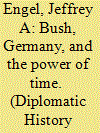

|
|
|
|
|
| Publication |
2013.
|
| Summary/Abstract |
George H.W. Bush backed German reunification with a puzzling degree of enthusiasm. His strategic reasoning was clear and not in dispute, as he desired to keep a unified Germany enmeshed within NATO. Less obvious, however, is his general forgiveness of Germany's past, for which he was pilloried. Yet history was much on Bush's mind in reaching these decisions. Germans had learned from the past, he argued. Europeans had not. They could not keep the peace no matter their ongoing political consolidation, his administration concluded by reading European history, without Americans in their midst. Bush backed unification, therefore, to ensure NATO's survival and thus an ongoing American presence on the continent. By studying Bush's sense of history, and a policymaker's historical sensibility more broadly, historians can thus gain greater insight into this decision and how strategic decisions are more generally formed
|
|
|
|
|
|
|
|
|
|
|
|
|
|
|
|
| 3 |
ID:
133077
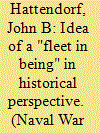

|
|
|
|
|
| Publication |
2014.
|
| Summary/Abstract |
The phrase "fleet in being" is one of those troublesome terms that naval historians and strategists have tended to use in a range of different meanings. The term first appeared in reference to the naval battle off Beachy Head in 1690, during the Nine Years' War, as part of an excuse that Admiral Arthur Herbert, first Earl of Torrington, used to explain his reluctance to engage the French fleet in that battle. A later commentator pointed out that the thinking of several British naval officers ninety years later during the War for American Independence, when the Royal Navy was in a similar situation of inferior strength, contributed an expansion to the fleet-in-being concept. To examine this subject carefully, it is necessary to look at two separate areas: first, the development of the idea of the fleet in being in naval strategic thought, and, second, the ideas that arose in the Royal Navy during the War of the American Revolution.
|
|
|
|
|
|
|
|
|
|
|
|
|
|
|
|
| 4 |
ID:
131448
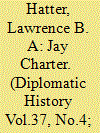

|
|
|
|
|
| Publication |
2013.
|
| Summary/Abstract |
This article reinterprets the Jay treaty by taking seriously the Republican criticism of the treaty's western provisions, which created a porous border between the United States and British-Canada. It argues that Laurentine merchants-entrepreneurs interested in the trade of the extended St. Lawrence River valley-used the Jay treaty as a charter, protecting their commercial and political rights as British subjects residing and trading in the United States. By exploring the conflicts between Laurentine merchants and federal officials over the terms of the Jay charter, this article opens a window on the complex process of state formation in the Anglo-American borderland between 1796 and 1819. It argues that state formation involved a wide array of activities and innovations at both the center and the periphery. More specifically, the article points to the important role that diplomacy, Republican commercial policy, and legal definitions of citizenship played in the creation of an American national state.
|
|
|
|
|
|
|
|
|
|
|
|
|
|
|
|
| 5 |
ID:
127793
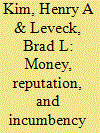

|
|
|
|
|
| Publication |
2013.
|
| Summary/Abstract |
Since 1972, campaign spending by House incumbents has skyrocketed, particularly in those districts with marginal support for the incumbent's party. At the same time, parties in the House have become much more cohesive in the way they vote, producing more precise and informative party brands. We argue that these two phenomena are fundamentally linked. As parties have developed more precise reputations, incumbents in these districts must spend much more to attract voters in "marginal" districts, who would be willing to vote for a candidate with the particular incumbent's legislative record, but not the average member of his party. Increasingly precise party reputations provide voters with stronger priors that incumbents are just like the rest of their party, and incumbents in marginal districts must spend more to overcome these beliefs. We demonstrate this using a simple formal model and test it empirically using campaign-spending data from 1972 to 2008.
|
|
|
|
|
|
|
|
|
|
|
|
|
|
|
|
| 6 |
ID:
132025
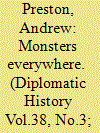

|
|
|
|
|
| Publication |
2014.
|
| Summary/Abstract |
This article, based on the 2014 Stuart L. Bernath Lecture, traces the emergence of "national security" as a foreign policy doctrine that came to define the safety of the United States in extremely broad terms, both geographically and ideologically. Doing so reveals that "national security" has its own history. The concept was invented by fusing long-standing, traditional concerns about U.S. territorial sovereignty with a newer, thoroughly revolutionary desire to protect and promote America's core values on a global scale. Franklin D. Roosevelt's legacy looms large in the history of American foreign relations, but it was his use of fear to invent the modern doctrine of national security that is possibly its most consequential aspect. After a couple of false starts, a fusion of geographical and ideological security took place during the world crisis of the late 1930s and the world war that followed. The results have defined U.S. foreign policy ever since.
|
|
|
|
|
|
|
|
|
|
|
|
|
|
|
|
| 7 |
ID:
132007


|
|
|
|
|
| Publication |
2014.
|
| Summary/Abstract |
William Eleroy Curtis was central to the creation of the Pan-American movement in the United States. As a lobbyist and bureaucrat, he helped organize the first Inter-American Conference in 1889-1890. As a journalist he became a leading "expert" on Latin America. This article uses Curtis to explore the relationship between Pan-Americanism and empire. Before 1898, Curtis sought only expanded trade, not territory for the United States. However, to explain why the country would "naturally" come to dominate Latin American markets, he depicted Latin Americans as backward yet capable of uplift through the infusion of U.S. knowledge and capital. He thus justified hemispheric control and helped U.S. Americans envision empire as a tutelary imperative. When Curtis supported territorial expansion in 1898 he did so in the language of civilizing mission rather than market aggrandizement. In combining narratives of difference and equality, Pan-Americanism served Curtis as a transitional imperial ideology.
|
|
|
|
|
|
|
|
|
|
|
|
|
|
|
|
| 8 |
ID:
131447
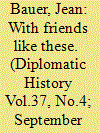

|
|
|
|
|
| Publication |
2013.
|
| Summary/Abstract |
In the summer of 1780, John Adams and the Comte de Vergennes crossed epistolary swords over America's status in the Franco-American Alliance. Understanding their irreconcilable policies explains how a minor dispute about paper money erupted into a fight over the control of post-war American commerce, which became a battle over the proper deployment of the French Navy in the New World, which led to mutual accusations of betrayal and treason. France thought the United States was its client state, bound to assist France against its enemies, particularly Great Britain. At the same time, American politicians followed the logic of the Model Treaty and "free ships make free goods" to claim America as a neutral state, free to sell its staple agricultural products to whomever offered the best price, including Britain. This difference underlies all the major conflicts of Franco-American relations through the end of the Napoleonic Wars.
|
|
|
|
|
|
|
|
|
|
|
|
|
|
|
|
|
|
|
|
|